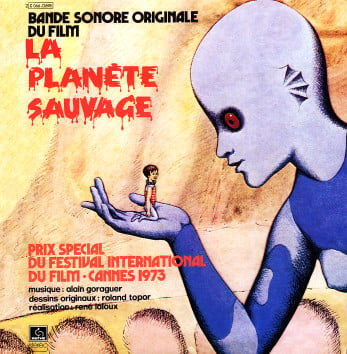Progarchives.com has always (since 2002) relied on banners ads to cover web hosting fees and all.
Please consider supporting us by giving monthly PayPal donations and help keep PA fast-loading and ad-free forever.
/PAlogo_v2.gif) |
|
Post Reply 
|
Page <1 56789 11> |
| Author | ||||
Logan 
Forum & Site Admin Group 

Site Admin Joined: April 05 2006 Location: Vancouver, BC Status: Offline Points: 33086 |
 Posted: September 02 2008 at 14:32 Posted: September 02 2008 at 14:32 |
|||
the term rock derives from rock & roll (which describes a motion) -- bother metal and rock evolved from it (as well as from pop). Heavy metal owes much to blues-rock and psychadelic music. I still tend to think of metal as a subset of hard rock. Incidentally, probably been mention, but here's the wikipedia article on progressive metal: http://en.wikipedia.org/wiki/Progressive_metal
Incidentally, this highlights my concern with Metallica being considered a proto-prog metal band since I had thought that the Prog aspect in bands such as DT comes more from Prog rock than heavy metal bands such as Metallica. Edited by Logan - September 02 2008 at 14:35 |
||||
|
Just a music fan passing through trying to fill some void. Various music I am into now: a youtube playlist
|
||||
 |
||||
MikeEnRegalia 
Special Collaborator 

Honorary Collaborator Joined: April 22 2005 Location: Sweden Status: Offline Points: 20667 |
 Posted: September 02 2008 at 14:40 Posted: September 02 2008 at 14:40 |
|||
I don't agree. Of course it's amazing if someone can deliver a magnificent performance in the first take, but that doesn't mean that it's spontaneous ... the musician might have practiced that *many* times at home. Classical musicians spend hours working on short passages of their performance until they get it right.
This wasn't directed at me ... nevertheless I'd like to say that while I like the track I can see why some people might not like it. I would use attributes like "cold" and "technical" to describe it ... whether you like that or not is a matter of taste.
http://de.youtube.com/watch?v=J9Y9Davme-s That's "widdly". It's not particularly good IMO, but I wouldn't join the one who posted the video in calling it "idiot with a guitar playing widdly stuff". It shows how some people perceive technical, fast parts ... they "shut" their ears and immediately judge them as being flashy, unnecessary and immature. Now, in my opinion they often are, but it totally depends on the situation. Some will say that there simply should not be too much of it in a song, but IMO anything can make sense. There can be beautiful tracks which consist of 100% shred (Steve Vai - Juice, anyone?) and there can be tracks which hardly feature any "short notes" at all. That's the beauty of music. |
||||
 |
||||
MikeEnRegalia 
Special Collaborator 

Honorary Collaborator Joined: April 22 2005 Location: Sweden Status: Offline Points: 20667 |
 Posted: September 02 2008 at 14:47 Posted: September 02 2008 at 14:47 |
|||
I understand what you mean. I would look at it from a different angle: In the early 80s metal bands like Iron Maiden and Metallica were playing around with progressive elements in their music ... but after reaching a peak from 86-88 those progressive elements got rarer again. During this peak the first prog metal bands arose (Fates Warning, Dream Theater, Queensryche) who - in a way - picked up those progressive elements and refined them, creating a new style of metal which not only contained progressive elements but made them the central part. Does that make sense?  |
||||
 |
||||
Logan 
Forum & Site Admin Group 

Site Admin Joined: April 05 2006 Location: Vancouver, BC Status: Offline Points: 33086 |
 Posted: September 02 2008 at 15:06 Posted: September 02 2008 at 15:06 |
|||
I understand what you mean... Digressions: I had a friend into heavy metal in the '80s, and I thought Metallica more "progressive" (and better speaking from personal taste) than Iron Maiden. I still value progressiveness more highly than retro-Prog qualities. |
||||
|
Just a music fan passing through trying to fill some void. Various music I am into now: a youtube playlist
|
||||
 |
||||
MikeEnRegalia 
Special Collaborator 

Honorary Collaborator Joined: April 22 2005 Location: Sweden Status: Offline Points: 20667 |
 Posted: September 02 2008 at 15:12 Posted: September 02 2008 at 15:12 |
|||
|
^ just as a rule of thumb I'd say that those who value progressiveness more tend to prefer Metallica, those who mainly go "by style" tend to prefer Iron Maiden. But of course most people really like both ... if you like modern metal, it's kind of hard to dislike Iron Maiden or Metallica.

|
||||
 |
||||
Logan 
Forum & Site Admin Group 

Site Admin Joined: April 05 2006 Location: Vancouver, BC Status: Offline Points: 33086 |
 Posted: September 02 2008 at 15:37 Posted: September 02 2008 at 15:37 |
|||
|
I like the more avant metal bands particularly (not the ones with growling so much), and jazz-metal fusion bands. I really should explore more "chamber metal."
|
||||
|
Just a music fan passing through trying to fill some void. Various music I am into now: a youtube playlist
|
||||
 |
||||
MikeEnRegalia 
Special Collaborator 

Honorary Collaborator Joined: April 22 2005 Location: Sweden Status: Offline Points: 20667 |
 Posted: September 02 2008 at 15:42 Posted: September 02 2008 at 15:42 |
|||
|
^ "Chamber Metal" ... I guess you know Grayceon then.
 http://progfreak.com/home/charts.xhtml?chart.genre=metal&chart.tag.1=chamber Feel free to tag more albums as chamber+metal ... right now I can't think of any! |
||||
 |
||||
Petrovsk Mizinski 
Prog Reviewer 

Joined: December 24 2007 Location: Ukraine Status: Offline Points: 25210 |
 Posted: September 03 2008 at 05:03 Posted: September 03 2008 at 05:03 |
|||
|
||||

|
||||
 |
||||
mr70s 
Forum Senior Member 

Joined: July 21 2008 Location: UK Status: Offline Points: 121 |
 Posted: September 03 2008 at 06:18 Posted: September 03 2008 at 06:18 |
|||
|
I agree entirely with your comments. It's a joy to hear perfectly executed, highly technical guitar playing. I too, cringe at any sloppy technique (including my own
 ) I think Jarzombek is a fantastic guitarist, but sometimes the music takes 2nd place to the actual execution of it. Of course, there is always badly played, bad music - now there's a combination ! ) I think Jarzombek is a fantastic guitarist, but sometimes the music takes 2nd place to the actual execution of it. Of course, there is always badly played, bad music - now there's a combination ! 
|
||||
 |
||||
Certif1ed 
Special Collaborator 

Honorary Collaborator Joined: April 08 2004 Location: England Status: Offline Points: 7559 |
 Posted: September 03 2008 at 08:08 Posted: September 03 2008 at 08:08 |
|||
I'm less defensive than irritated that the entire point of that link was missed, and not just by you.
I did not ask "do you like this track?" - that was never the question I posed or the reason for posting the link - that was your question, and unfortunately, the discussion got derailed at the moment opinions on the music itself started appearing.
It seems that no-one's really interested in discussing or defining Prog Metal except Hughes and Teo, so presumably that means there will not be any more arguments about which bands are and which are not Prog Metal, since no-one cares what it is...
|
||||
|
The important thing is not to stop questioning.
|
||||
 |
||||
MikeEnRegalia 
Special Collaborator 

Honorary Collaborator Joined: April 22 2005 Location: Sweden Status: Offline Points: 20667 |
 Posted: September 03 2008 at 08:15 Posted: September 03 2008 at 08:15 |
|||
|
^ I'm interested in defining prog metal, you simply don't accept my approach - or that of the rest of the world, for that matter.
|
||||
 |
||||
trackstoni 
Forum Senior Member 

Joined: February 23 2008 Location: Lebanon Status: Offline Points: 934 |
 Posted: September 03 2008 at 10:53 Posted: September 03 2008 at 10:53 |
|||
|
Disagree about your replys from the beginning of this forum , till the end . too much theories & definisions . So far no one said , that Prog Metal Is a kind of freak , i've just simply said that Metal must be separated from Progressive , it doesn't belong to progressive rock that we knew since 1968 . If it is a crime , please tell me ????????? I told you , i have no problem with this mania , as i was in the early 70's . bands like Black Sabbath , Deep Purple , Uriah Heep , Dust , Budgie , Led Zep , cannot be compared with Yes , Van Der Graaf , Jethro Tull , King Crimson , Le Orme , PFM , Mahavishnu & Zappa . And to dig wider Gong , Soft Machine , Caravan , Agitation Free , it's completely different styles , Genres , Mentality , techniques , and Period . I like Heavy Metal , but it's only serving for one purpose , no matter what definitions & Theories you're gonna invent , so , do not use your stripes or stars to convince us , it doesn't make any sence to compare Van Der Graaf , Yes or King Crimson , not even Renaissance with Dreamtheater or Symphony X or any one else , so be reasonnable , and enjoy what you've had from previous generations , and what you have now . And , about Spastic Ink , it will take me with my team to do what they have done few hours , but perform Thick as a Brick , Siberian , Sailor tail , the Musical box , or the Sleepwalkers , i believe , that we can't just get close to , no matter what , so , take it easy , and , let it go , cause i don't like guitar riffs to contol my dreams , Anyway ////////// we respect your opinion , so respect ours . Toni
|
||||
|
Tracking Tracks of Rock
|
||||
 |
||||
mr70s 
Forum Senior Member 

Joined: July 21 2008 Location: UK Status: Offline Points: 121 |
 Posted: September 03 2008 at 11:34 Posted: September 03 2008 at 11:34 |
|||
I apologise if you feel that I in any way derailed the discussion. You see I cannot resist asking questions.
There will always be arguments about which bands are and which are not prog metal. I hope that an atmosphere of mutual respect will prevail so that these issues can still be debated. There are many people who really care about prog metal, and I for one am thankful that there are so many musicians who are willing to keep pushing that envelope, rather like those bands of the early and mid - seventies. Edited by mr70s - September 03 2008 at 12:15 |
||||
 |
||||
Certif1ed 
Special Collaborator 

Honorary Collaborator Joined: April 08 2004 Location: England Status: Offline Points: 7559 |
 Posted: September 03 2008 at 14:13 Posted: September 03 2008 at 14:13 |
|||
Where have I rejected your approach - or anyone else's?
All I am doing is reading the current "definitions" and noting that, in fact, they do not describe the music, let alone define it.
I don't think the rest of the world is happy with this - this thread would appear to be clear evidence that there is still ignorance about the music (and ignorance is not in itself an insulting term, please note my careful use of it), which stems from poor definitions - or we could use the looser word description instead, if you prefer.
Your putting me on a pedestal as being alone in thinking that Prog Metal is poorly defined is puzzling. How does that help the discussion? Is it actually true - does everyone else in the wolrd know what it is whilst I languish in ignorance? If that's the case, why is there so much argument about it (and not just in this thread - this is a common topic)?
Questions are good - I like questions, but topical ones are favourite
|
||||
|
The important thing is not to stop questioning.
|
||||
 |
||||
sleeper 
Prog Reviewer 

Joined: October 09 2005 Location: Entropia Status: Offline Points: 16449 |
 Posted: September 03 2008 at 14:42 Posted: September 03 2008 at 14:42 |
|||
|
^I think Mikes comment comes from your previous position of prog metal not being particularly prog, though judging by your recent comments it looks like you might be reconsidering that
|
||||
|
Spending more than I should on Prog since 2005
 |
||||
 |
||||
MikeEnRegalia 
Special Collaborator 

Honorary Collaborator Joined: April 22 2005 Location: Sweden Status: Offline Points: 20667 |
 Posted: September 03 2008 at 16:05 Posted: September 03 2008 at 16:05 |
|||
Please, where's the difference between you saying that "they do not describe the music" and me saying that you don't accept them? Can't I safely assume that you won't accept a definition if it - in your opinion - fails to describe or define the item it is about?
I'll ignore the insulting connotation of the word "poor" for now ...  With all due respect, I don't think the definitions are nearly as horrible as you describe them. The definitions which I wrote for PA are rough drafts, and I would say myself that they need improvement. But The definition at wikipedia for example is quite usable IMO. If I had more time on my hands and got around to improving the drafts I wrote last year, I guess that the result would not be all that different from what's currently on wikipedia. have a look at the current introduction at wikipedia: "Progressive metal (often referred to simply as prog metal) is a sub-genre of heavy metal music which blends the powerful, guitar-driven sound of metal with the complex compositional structures, odd time signatures, and intricate instrumental playing of progressive rock. Some progressive metal bands are also influenced by jazz fusion and classical music. Like progressive rock songs, progressive metal songs are usually much longer than standard metal songs, and they are often thematically linked in concept albums. As a result, progressive metal is rarely heard on mainstream radio and video programs." Nothing wrong with this, and it is also quite compatible with what Teo is saying - and I agree, for that matter - that prog metal is quite different from prog rock. It even confirms the split we made some time ago: "Recently, with a new wave of popularity in shred guitar, the previously shunned idea of "technical metal" has become increasingly prevelant and popular in the metal scene. This has led to a resurgence of popularity for more traditional progressive metal bands like Dream Theater and Symphony X, and also has led to the grouping of the "prog metal" scene bands that do not necessarily play in the traditional "prog metal" style such as Nevermore, Children of Bodom, Into Eternity and indeed Opeth and Meshuggah as well. These bands are, rightly or wrongly, often labelled as "progressive metal" as they do play relativly complex and technical metal music that cannot be entirley associated with other metal subgenres. Technical death metal bands like Necrophagist and Arsis are also often associated with the same subculture of heavy metal fans as well." This is also how I see things ... these bands are not "progressive metal" as in the type of music which initially defined the movement. They are included because they - together with Post Metal, Avant-Garde Metal and what I would call Art Metal - take the spirit of experimentation and development, which both Prog Rock and Prog Metal have in common, to new styles and concepts.  |
||||
 |
||||
debrewguy 
Special Collaborator 
Honorary Collaborator Joined: April 30 2007 Location: Canada Status: Offline Points: 3596 |
 Posted: September 03 2008 at 21:04 Posted: September 03 2008 at 21:04 |
|||
|
So prog metal is really a sub-genre of metal. And Jazz Fusion is a sub-genre of Jazz. And Jazz Fusion is considered prog despite the fact that it is not descended from prog rock.
Is folk prog , as it really is a folk genre ? Is there actually a genre that is named Prog, and nothing else to qualify or clarify or even define what type of music it is ? Ya know, like Yes are a Prog band. Just like Tull are a prog band. And Rush are a Prog Band. And Renaissance are a prog band. And Faust are a prog band. RIGHT !!!!!!!!!! |
||||
|
"Here I am talking to some of the smartest people in the world and I didn't even notice,” Lieutenant Columbo, episode The Bye-Bye Sky-High I.Q. Murder Case.
|
||||
 |
||||
Henry Plainview 
Forum Senior Member 

Joined: May 26 2008 Location: Declined Status: Offline Points: 16715 |
 Posted: September 04 2008 at 01:35 Posted: September 04 2008 at 01:35 |
|||
debrew, I've seen you post many times, and here is your problem: you keept trying to think about these things logically. Just go with the flow.
|
||||
|
if you own a sodastream i hate you
|
||||
 |
||||
Certif1ed 
Special Collaborator 

Honorary Collaborator Joined: April 08 2004 Location: England Status: Offline Points: 7559 |
 Posted: September 04 2008 at 03:49 Posted: September 04 2008 at 03:49 |
|||
OK, let's examine this;
"complex compositional structures".
Just about every "Prog Metal" piece I've heard from "representative" bands lacks these in abundance, and where the structures are "complex", they tend to be mere extensions of the type of structures that Metallica brought to Heavy Metal. I analysed this ages agon in a thread in which you participated, so will not repeat the process here.
Not ONE matches the complexity of, say "The Musical Box" or "On Reflection" - until there is a piece of Prog Metal that does match the complexity in form of Prog Rock, this statement is actually false and misleading.
"odd time signatures and intricate instrumental playing of progressive rock"
I don't find riffing particularly intricate - anyone can play power chords. The intricacies of Prog Rock stem from the musicians playing independent parts that make up a greater whole. The "intricacies" of heavy metal lie more in challenging techniques, usually made challenging by one or more of the components, rather than an attempt to express something.
Again, the two examples of Prog Rock I chose are good examples of where techniques are adapted primarily for the expression of the song.
In short, the techniques are NOT those of progressive rock, but those of progressive metal, which is why this definition is wildly misleading (and the thrust of Teo's argument).
"influenced by jazz fusion"...
Not many of them - this is not a typical characteristic. Where such influence is apparent, it's usually indirect - e.g. where a guitarist has had lessons from Joe Satriani and practised his modes. The end result does not normally come across as anything to do with jazz - with obvious (rare) exceptions.
"Classical Music" Again, rarely - and what I've heard tends to be cycle of fifths stuff, or a keyboard playing a string sound. This is not a typical characteristic, as it is in Prog.
"Like progressive rock songs, progressive metal songs are usually much longer than standard metal songs, and they are often thematically linked in concept albums. As a result, progressive metal is rarely heard on mainstream radio and video programs"
Wouldn't you agree that this is tentative stuff? Why doesn't this describe "Master of Puppets"?
Indeed, all of the above describes "Master of Puppets", except the jazz fusion bit.
In short, the whole definition IS wrong - and that's not my opinion, just the facts staring everyone in the face.
I can accept some of the above, but this more accurately describes the music of Dream Theater (for example) than the Progressive Metal definition does.
Again, Metallica fit perfectly here. Not as "related" or "proto", but their early output fits both descriptions, particularly (but not solely) when you look at the historical context (which all of this ignores).
The "spirit of experimentation and development" as you call it is the most tentative part - I don't think it's the same spirit at all, there's really not that much experimentation, and "development" means something completely different to a musician, as an element that is present in classic Prog Rock but not in Progressive Metal, which I've discussed many times - but these are long discussions all by themselves that should have their own threads. |
||||
|
The important thing is not to stop questioning.
|
||||
 |
||||
MikeEnRegalia 
Special Collaborator 

Honorary Collaborator Joined: April 22 2005 Location: Sweden Status: Offline Points: 20667 |
 Posted: September 04 2008 at 05:50 Posted: September 04 2008 at 05:50 |
|||
|
||||
 |
||||
Post Reply 
|
Page <1 56789 11> |
| Forum Jump | Forum Permissions  You cannot post new topics in this forum You cannot reply to topics in this forum You cannot delete your posts in this forum You cannot edit your posts in this forum You cannot create polls in this forum You cannot vote in polls in this forum |